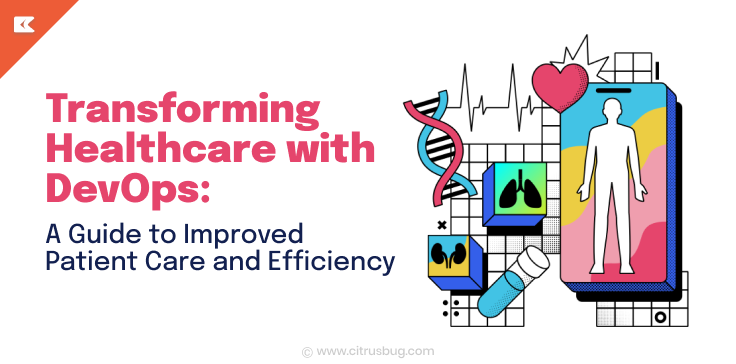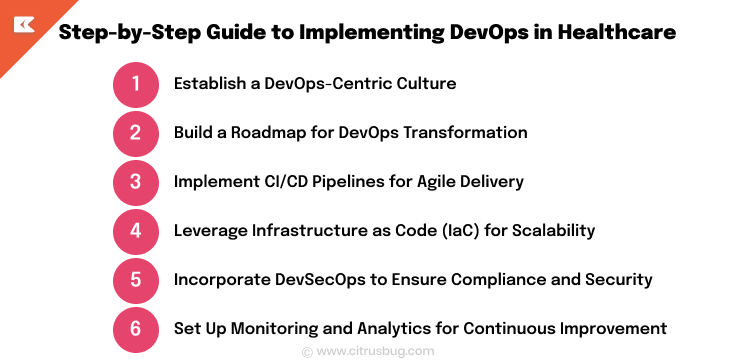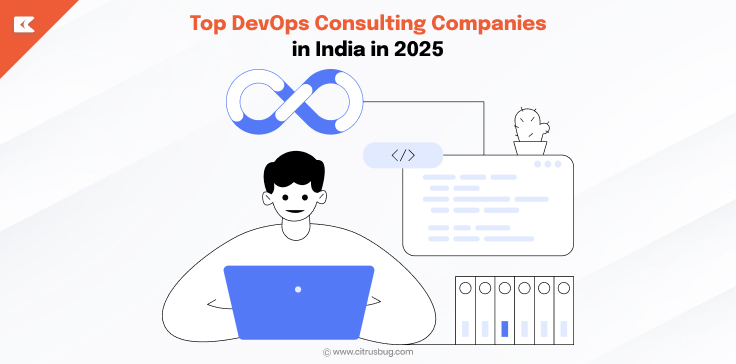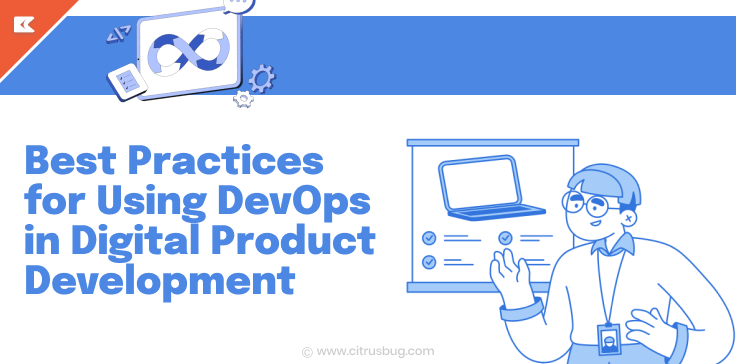DevOps in Healthcare: Improved Patient Care & Efficiency
- November 15, 2024
-
3268 Views
- by Ishan Vyas
Table of Contents
- 1. Why DevOps is Essential for Modern Healthcare
- 2. Key Principles of DevOps in Healthcare
- 3. Step-by-Step Guide to Implementing DevOps in Healthcare
- 4. Case Studies: DevOps Transformations in Healthcare
- 5. Challenges and Solutions in Implementing DevOps in Healthcare
- 6. Future Trends: DevOps in Healthcare Technology
- Conclusion: Transforming Healthcare with DevOps
As healthcare organizations become more engaged in digital solutions for simplification and betterment of the care of a patient, DevOps has emerged as one of the most vital approaches to transform operational efficiency and ensure compliance. Hence, by the role of DevOps in healthcare, the providers can accelerate development cycles, enhance reliability of the system, and optimize the resources. In this paper, ways will be identified for healthcare organizations to implement DevOps to make way for a safe, scalable, and efficient healthcare ecosystem.
1. Why DevOps is Essential for Modern Healthcare
Healthcare providers face particular challenges in regulatory compliance, security, and delivering quality patient care. Current DevOps trends, such as automation and continuous integration, address these challenges by streamlining processes, enhancing team collaboration, and reducing time to market. This makes DevOps especially valuable for healthcare organizations aiming to be competitive, patient-focused, and stand out in an increasingly digital world.
-
Enhanced Collaboration and Efficiency
It promotes an intra-collaborative culture among teams of development, operations, and security. Streamlining the process by eliminating silos between these groups helps in quick resolution of problems and removes bottlenecks so that healthcare software applications can be developed faster and updated in the market more quickly.
-
Strengthened Security and Compliance
It integrates security measures with every stage of development which is otherwise known as DevSecOps. To the healthcare organization, it ensures better control over patient data and makes them liable for instances where certain regulatory standards such as HIPAA become stricter. HealthIT.gov recently reported that maintaining data security is the principal basis on which trust is established in the digital healthcare solutions
-
Improved Patient Experience
DevOps empowers healthcare providers to improve patient interactions through the fast and consistent delivery of high-quality software solutions. From faster response times in telemedicine to secure and reliable patient portals, DevOps enables user-centric healthcare solutions.
2. Key Principles of DevOps in Healthcare
-
Continuous Integration and Continuous Delivery (CI/CD)
CI/CD pipelines ensure there is no error in software development since testing and deployment are automated; hence, a health care organization’s providers will be able to respond to changing needs and regulations with desirable expeditiousness as required by the National Institutes of Health (NIH).
-
Infrastructure as Code (IaC)
IaC empowers the management of infrastructure using code. Environments can be set up and scaled easily. Healthcare environments have many reasons to ensure consistency for reliable access to patient data and other critical systems. Microsoft’s DevOps for Healthcare guide stresses scalability and reliability, which makes IaC a strong consideration.
-
Automated Monitoring and Logging
Automated monitoring detects problems before they affect users. A healthcare environment relies on monitoring for stability of the application, patient safety, and compliance. Learn more about monitoring from HealthcareITNews for preventing outages.
3. Step-by-Step Guide to Implementing DevOps in Healthcare
Step 1: Establish a DevOps-Centric Culture
The team needs to be formed with the development, operations, security, and compliance members. Clear communication will drive everyone who shares the same goals toward building a collaborative DevOps environment in healthcare, considering its complex regulatory and data privacy needs.
Step 2: Build a Roadmap for DevOps Transformation
Identify the goals, challenges, and priorities of your organization. Describe the implementation of DevOps in stages, with its core areas being automation, integration into security, and resource management. Collaboration with a leading healthcare software development company can be beneficial in order to build expertise and provide guidance in framing an actionable roadmap. DevOps transformation’s success factors are strategic goals, according to McKinsey’s report.
Step 3: Implement CI/CD Pipelines for Agile Delivery
DevOps is the heart of CI/CD pipelines. So, first, you automate the testing and deployment processes to reduce manual efforts and possible errors. This makes a real difference in the level of service provided and ensures compliance depending on how fast you can roll out software updates with AWS. There are good tools and guidance on implementing CI/CD pipelines for healthcare applications using AWS.
Step 4: Implementation of Infrastructure as Code (IaC) for scalability
Infrastructure as Code enables healthcare organizations to repeat the infrastructure easily and consistently, which is extremely essential for disaster recovery and scalability. Additionally, automation of the environment configurations through IaC allows it to dispense with the possibilities of too many human errors in setup, ensuring that healthcare services remain available.
Step 5: Incorporate DevSecOps to Ensure Compliance and Security
Health care is concerned much with security and compliance. DevSecOps ties together security testing into the development cycle, so vulnerability detection happens much earlier. This is because, by automating security checks, healthcare providers can then be able to adhere to all regulatory standards without in any way affecting development timelines.
Step 6: Establish monitoring and analysis for continuous improvement
It should also have monitoring tools that can track the performance of applications to quickly rectify issues that begin to arise. In healthcare, real-time monitoring is imperative in order to prevent system downtimes or data breaches, which could profoundly impact patient care. Analytics will then help providers analyze trends and make informed decisions in the future about what improvements should be made in software.
4. Case Studies: DevOps Transformations in Healthcare
-
Kaiser Permanente
Kaiser Permanente is one of the largest players in the healthcare field in the United States and, to accelerate their time-to-market for software updates as well as to further secure patient data, adopted DevOps practices. Through automated CI/CD pipelines, downtime is minimalized, and access to patient information is possible.
-
Mayo Clinic
Mayo Clinic uses DevOps to streamline IT infrastructure and increase agility in its software delivery. DevOps has allowed them to provide a more reliable platform for patient records, ensuring data security and improving patient outcomes.
5. Challenges and Solutions in Implementing DevOps in Healthcare
- Challenge: Compliance with Healthcare Regulations
Solution: In DevSecOps practice, at every developmental stage, regulatory requirements are infused into the workflow, so that for HIPAA compliance, system development does not have to give up its focus on development. HIPAA Journal provides additional insights on maintaining compliance within DevOps workflows. - Challenge: Protecting Sensitive Patient Data
Solution: DevOps integrates automated security testing, encryption, and access control protocols. These features assure patient data and ensure that healthcare providers meet all the essential standards of security. For more information on how data security practices in health care work, see HIMSS. - Challenge: Managing Legacy Systems
Solution: Implementing a DevOps framework is a challenging job with legacy systems. One possible step to gradually integrate DevOps into older systems is by starting off with automated monitoring and logging through a hybrid approach.
6. Future Trends: DevOps in Healthcare Technology
-
AI and Machine Learning Integration
All of this work with AI in DevOps will help automate security alerts, optimize CI/CD processes, and give predictive insights to prevent issues from arising, among many other things. It can also contribute to the personalization of patient care and optimization of resource use. Many healthcare businesses are already approaching AI consulting services to stay ahead in the trend.
-
Hybrid Cloud Environments
Hybrid cloud setup is gaining significance as it provides cloud flexibility and scalability with the required security in healthcare. DevOps is making easier integration into the cloud and flexible operation with improved data accessibility and adaptability to business operations.
-
Advanced Data Analytics
Healthcare providers can apply the DevOps to collect and analyze the data regarding the performance of their applications and the method through which the users will utilize them toward the goal of proactive improvement of system performance as well as patient experience.
Conclusion: Transforming Healthcare with DevOps
The implementation of DevOps in healthcare describes a constant cultural shift, new technology adoption, and automation in process. Joining a leading healthcare software development company or availing development services for DevOps may help the healthcare organization gain more agility in improving patient care and also achieve regulatory requirements. In this evolving nature of healthcare, DevOps forms a base for innovation, through which healthcare service providers can efficiently and safely offer quality care.





 SaaS Development
SaaS Development Web Application Development
Web Application Development Mobile Application Development
Mobile Application Development Custom Software Development
Custom Software Development Cloud Development
Cloud Development DevOps Development
DevOps Development MVP Development
MVP Development Digital Product Development
Digital Product Development Hire Chatbot Developers
Hire Chatbot Developers Hire Python Developers
Hire Python Developers Hire Django Developers
Hire Django Developers Hire ReactJS Developers
Hire ReactJS Developers Hire AngularJS Developers
Hire AngularJS Developers Hire VueJS Developers
Hire VueJS Developers Hire Full Stack Developers
Hire Full Stack Developers Hire Back End Developers
Hire Back End Developers Hire Front End Developers
Hire Front End Developers AI Healthcare Software Development & Consulting
AI Healthcare Software Development & Consulting Healthcare App Development
Healthcare App Development EHR Software Development
EHR Software Development Healthcare AI Chatbot Development
Healthcare AI Chatbot Development Telemedicine App Development Company
Telemedicine App Development Company Medical Billing Software Development
Medical Billing Software Development Fitness App Development
Fitness App Development RPM Software Development
RPM Software Development Medicine Delivery App Development
Medicine Delivery App Development Medical Device Software Development
Medical Device Software Development Patient Engagement Software Solutions
Patient Engagement Software Solutions Mental Health App Development
Mental Health App Development Healthcare IT Consulting
Healthcare IT Consulting Healthcare CRM Software Development
Healthcare CRM Software Development Healthcare IT Managed Services
Healthcare IT Managed Services Healthcare Software Testing services
Healthcare Software Testing services Medical Practice Management Software
Medical Practice Management Software Outsourcing Healthcare IT Services
Outsourcing Healthcare IT Services IoT Solutions for Healthcare
IoT Solutions for Healthcare Medical Image Analysis Software Development Services
Medical Image Analysis Software Development Services Lending Software Development Services
Lending Software Development Services Payment Gateway Software Development
Payment Gateway Software Development Accounting Software Development
Accounting Software Development AI-Driven Banking App Development
AI-Driven Banking App Development Insurance Software Development
Insurance Software Development Finance Software Development
Finance Software Development Loan Management Software Development
Loan Management Software Development Decentralized Finance Development Services
Decentralized Finance Development Services eWallet App Development
eWallet App Development Payment App Development
Payment App Development Money Transfer App Development
Money Transfer App Development Mortgage Software Development
Mortgage Software Development Insurance Fraud Detection Software Development
Insurance Fraud Detection Software Development Wealth Management Software Development
Wealth Management Software Development Cryptocurrency Exchange Platform Development
Cryptocurrency Exchange Platform Development Neobank App Development
Neobank App Development Stock Trading App Development
Stock Trading App Development AML software Development
AML software Development Web3 Wallet Development
Web3 Wallet Development Robo-Advisor App Development
Robo-Advisor App Development Supply Chain Management Software Development
Supply Chain Management Software Development Fleet Management Software Development
Fleet Management Software Development Warehouse Management Software Development
Warehouse Management Software Development LMS Development
LMS Development Education App Development
Education App Development Inventory Management Software Development
Inventory Management Software Development Property Management Software Development
Property Management Software Development Real Estate CRM Software Development
Real Estate CRM Software Development Real Estate Document Management Software
Real Estate Document Management Software Construction App Development
Construction App Development Construction ERP Software Development
Construction ERP Software Development









